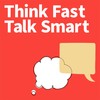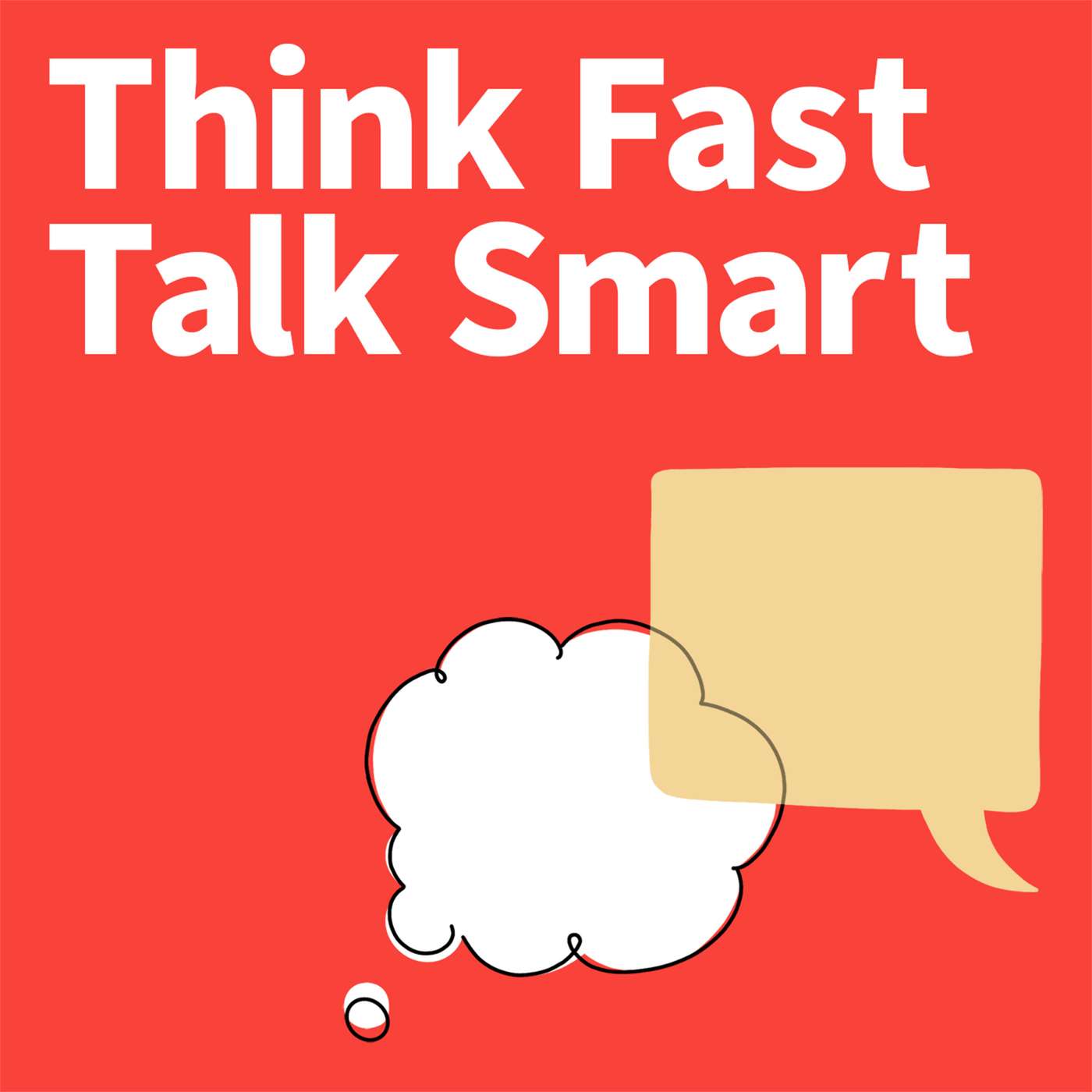

Think Fast Talk Smart: Communication Techniques
Matt Abrahams, Think Fast Talk Smart
One of the most essential ingredients to success in business and life is effective communication.
Join Matt Abrahams, best-selling author and Strategic Communication lecturer at Stanford Graduate School of Business, as he interviews experts to provide actionable insights that help you communicate with clarity, confidence, and impact. From handling impromptu questions to crafting compelling messages, Matt explores practical strategies for real-world communication challenges.
Whether you’re navigating a high-stakes presentation, perfecting your email tone, or speaking off the cuff, Think Fast, Talk Smart equips you with the tools, techniques, and best practices to express yourself effectively in any situation. Enhance your communication skills to elevate your career and build stronger professional relationships.
Tune in every Tuesday for new episodes. Subscribe now to unlock your potential as a thoughtful, impactful communicator. Learn more and sign up for our eNewsletter at fastersmarter.io.
Join Matt Abrahams, best-selling author and Strategic Communication lecturer at Stanford Graduate School of Business, as he interviews experts to provide actionable insights that help you communicate with clarity, confidence, and impact. From handling impromptu questions to crafting compelling messages, Matt explores practical strategies for real-world communication challenges.
Whether you’re navigating a high-stakes presentation, perfecting your email tone, or speaking off the cuff, Think Fast, Talk Smart equips you with the tools, techniques, and best practices to express yourself effectively in any situation. Enhance your communication skills to elevate your career and build stronger professional relationships.
Tune in every Tuesday for new episodes. Subscribe now to unlock your potential as a thoughtful, impactful communicator. Learn more and sign up for our eNewsletter at fastersmarter.io.
Episodes
Mentioned books

574 snips
Mar 11, 2025 • 29min
190. Motivation Matters: How to Leverage What People Already Want
Dan Heath, a New York Times bestselling author and expert in persuasion, shares his insights on mobilizing change without crafting new motivations. Instead of convincing others from scratch, he encourages tapping into their existing desires. Heath discusses the concept of 'leverage points'—small efforts that yield significant results—and emphasizes the power of storytelling in engaging audiences. He explores how personal anecdotes and practical strategies can enhance communication and drive organizational success. Discover how to turn latent motivation into an engine for impactful change!

317 snips
Mar 4, 2025 • 24min
189. Numbers Need Narrative: Use Data to Influence and Inspire
Miro Kazakoff, a senior lecturer at MIT Sloan and author of 'Persuading with Data', shares insights on the power of narrative in data presentation. He argues that while data can provide objectivity, its true impact comes from understanding your audience. Kazakoff emphasizes the importance of empathy, suggesting that effective communication lies in listening and framing data in a relatable way. He offers practical strategies, such as context and storytelling, to turn complex information into compelling narratives that engage and inspire.

228 snips
Feb 25, 2025 • 28min
188. Mind Reading 101: To Know What Your Audience Thinks, Just Ask
Matt Lieberman, a UCLA psychology professor and director of the Social Cognitive Neuroscience Lab, explores the nuances of communication. He emphasizes the difference between mind-reading and his concept of 'perspective-getting,' advocating for direct dialogue to enhance understanding. The conversation dives into how social and physical pain share neural pathways and explains the loneliness crisis through neuroimaging insights. Lieberman also highlights humility and curiosity as essential traits for effective communication.

315 snips
Feb 20, 2025 • 26min
187. Experimenting, Failing, and Finding Your Job Fit - Catalyze Your Career
Dorie Clark, a bestselling author and career strategist, challenges the traditional view of career paths, advocating for a mindset of experimentation. She emphasizes the importance of adaptability in career planning and suggests using informational interviews and LinkedIn strategies as essential tools for exploration. Clark discusses how personal branding can enhance career shifts and the role of mentorship in professional growth. She also highlights the value of being open to unexpected opportunities, asserting that reinvention should be a continuous habit.

486 snips
Feb 18, 2025 • 24min
186. Own Your Impact: How to Communicate Your Personal Power
Explore how tapping into personal power can transform communication. A strong belief in oneself enhances the persuasiveness of messages. Discover how mindsets shape interactions, especially in high-stakes situations like pitches. Learn the art of structuring compelling pitches that resonate with audiences by focusing on benefits. Embrace authenticity and master nonverbal cues to engage effectively. This insightful conversation offers research-backed strategies for impactful communication that starts from within.

4,662 snips
Feb 11, 2025 • 23min
185. Say Less, Mean More: Craft Compelling Communication
Guy Kawasaki, a renowned author and former chief evangelist for Apple, shares his insights on making communication captivating rather than merely informative. He emphasizes that storytelling should evoke emotions, suggesting that entertainment enhances the chance to inform. From crafting engaging presentations to utilizing the 10-20-30 rule, he offers practical strategies for pitches and talks. Kawasaki also discusses how fostering a growth mindset is crucial in both communication and personal endeavors, highlighting the transformative power of storytelling.

294 snips
Feb 6, 2025 • 25min
184. Fit or Quit? Find the Job That is Right For You—Catalyze Your Career
Catherine Fisher, Vice President of Global Consumer Communications at LinkedIn, shares her insights on proactive career growth. She emphasizes that true career success involves adaptability, networking, and taking control before challenges arise. Fisher discusses the importance of self-reflection, personal branding, and job crafting to align your work with your strengths. With practical strategies for navigating non-linear career paths and the power of self-advocacy, listeners will learn how to cultivate their careers actively, rather than reactively.

304 snips
Feb 4, 2025 • 30min
183. Rethinks: How Anxiety Can Fuel Better Communication
Kelly McGonigal, a Stanford GSB lecturer and best-selling author, discusses harnessing anxiety to enhance communication skills. She emphasizes reframing anxiety as a sign of care, which can deepen engagement during presentations. McGonigal shares how to channel nervous energy into confidence and connection, and the significance of empathy in tailoring messages. Her insights reveal how vulnerability can empower authentic communication, highlighting the essentials of curiosity, passion, and self-reflection for impactful dialogue.

455 snips
Jan 30, 2025 • 23min
182. Stop Chasing Time and Start Owning It: Communication, Happiness & Wellbeing
Cassie Holmes, a UCLA professor and author of "Happier Hour," shares insights on enhancing happiness through purposeful living. She emphasizes the importance of clarifying one’s purpose to make intentional choices in daily life. Holmes introduces practical strategies like the 'five whys' exercise and time audits to improve time management and reduce distractions. She also discusses how meaningful connections and effective communication play vital roles in overall well-being. Get ready to rethink how you spend your time and cultivate deeper connections!

242 snips
Jan 28, 2025 • 26min
181. Why Happiness is a Direction, Not a Destination: Communication, Happiness & Wellbeing
Arthur Brooks, a social scientist and Harvard Business School professor, discusses the concept that happiness is a journey grounded in relationships. He emphasizes that true contentment comes from connections with family, friends, and meaningful pursuits. Brooks argues for embracing both positive and negative emotions as parts of personal growth. He also addresses the impact of social media on relationships and shares practical strategies for enhancing well-being through effective communication. According to Brooks, love is the ultimate key to increasing happiness.


